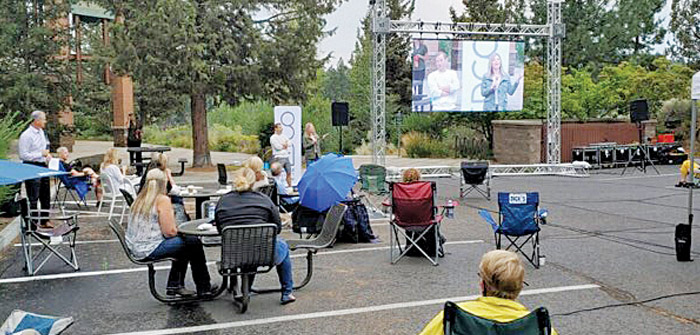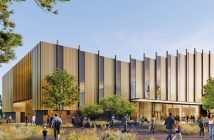(Photo | courtesy of EDCO)
EDCO Outdoor Virtual Event Streams Videos Highlighting Local Companies’ Craft
Economic Development for Central Oregon (EDCO’s) latest “Made in Bend” tour — presented in a novel “drive-in” style this year due to COVID restrictions — showcased the renowned diversity of our local economy, with a trio of companies, including one dating back to the 1940’s, illustrating the breadth of entrepreneurial spirit in the region.
Attendees seated outdoors in the parking lot of EDCO’s Old Mill District headquarters were given a glance at the inner workings of local firms making compelling products through virtual tours streamed via hi-tech LED screens, courtesy of Bend-based event production experts Flip Flop Sounds. Company representatives were also on hand afterward for an informative Question & Answer session.
First on the menu was Red Plate Foods, which is on a mission to connect people over delicious foods that are safe for everyone, including people with food allergies and celiac disease.
Company founders Becca and Chell Williams said that though they may produce healthy cookies, cupcakes, granola or muffins, they are primarily in the business of making life “normal” for people with special diets. The company name actually derives from a family tradition started in the 1970’s and the Williams clan continues to recognize accomplishments and special events like birthdays by serving the celebrated person with a red plate.
Red Plate makes baked goods that are vegan and free of the top eight food allergens (gluten/wheat, dairy, peanut, tree nut, soy, egg, fish and shellfish) in a dedicated facility in Bend, which continues to grow apace with the addition of production machinery to increase productivity.
The company’s products can now be found in the fresh bakery departments of retail grocers across the Western United States, and increasingly further afield, together with a growing area of supplying K-12 school systems nationwide.
The Williams’ know first-hand what it is like to deal with severe food allergies, with Chell having had to administer epinephrine shots multiple times when Becca was going into anaphylactic shock due to her dairy allergy. She developed a life-threatening allergic reaction to dairy in addition to a severe gluten intolerance after the birth of their fourth child.
Becca Williams said of the company’s initial inspiration, “When a nephew of ours was diagnosed as a toddler with peanut and tree nut allergies — and we saw his disappointment at not being able to eat grandma’s cookies along with other kids at a Christmas celebration — we realized there were few pre-made foods that the entire family could eat safely together.
“We quickly discovered that many other families were navigating life with multiple food allergies and sensitivities. And as we looked at what was available in trying to fulfill our family’s needs and found that there were at best mediocre offerings, we saw a hole in the market which we could fill by offering a gourmet, fresh-baked option.”
She observed that making foods without allergens is not without its challenges and when the company began, in 2013, it took several months to source dessert ingredients that were not cross contaminated with wheat.
Williams added, “As many as 15 million people in the United States suffer from food allergies, and nearly one third of U.S. adults follow a restricted diet because of food intolerances.
“For many families, enjoying celebration foods like cupcakes and cookies as well as healthful snacks is a challenge, and we are proud to provide safe products for people with multiple food allergies and intolerances.”
Next on deck for the virtual tour rotation was Argonaut Cycles, an independent frame builder founded some 12 years ago by Ben Farver, known for using the highest quality materials and hand crafting some of the world’s finest rider-customized carbon road bikes from its base in Bend’s NorthWest Crossing.
With the ability for geometry and “layup” patterns to be tailored specifically to the individual cyclist and a total weight typically coming in under 16 lbs., Argonaut bicycles are universally praised for fantastically fast, precise handling and overall quality.
The company’s line has received multiple awards and accolades within the industry, with one reviewer from Cyclist Mag raving, “I feel the Argonaut just has an extra modicum of tailored refinement that elevates it above anything I’ve tested.”
Sections of the frames are molded in single pieces before being bonded all together in a process that attunes to certain identified characteristics and involving over 80 man-hours per unit.
With investment in latest techniques, including patent-pending molding technology, CNC machinery and a 3-D printer, Farver is proud of the resulting vertical integration which allows the complete production process to be undertaken in-house.
He said, “Our Composite facility here in Bend is both workshop and showroom. This is where raw material is wheeled in and where completed bikes roll out.
“It’s the culmination of a huge effort to build off of our original Space Bike and bring all of Argonaut composite production under one roof.
“There is a lot of technical, space-age sort of stuff going on inside our bikes. But it’s all directed at one singular goal: to give the individual rider the best riding-bike possible.”
Farver actually started his bike building career working with steel in 2007, but his quest for more performance eventually led him to the almost limitless potential for customization by using carbon, with the ability for every Argonaut to be unique to the individual owner.
Bikes like the balanced, lively, Argonaut RM3 are available in both pre-designed and fully customized frame geometries, with prices ranging from $6,000 to around $15,000 for top of the line products, with Farver adding, “Your custom bike should fit like a glove from day one.
“Long story short, making a carbon fiber bicycle frame with a deliberate, specific layup schedule throughout is a giant undertaking, and creating custom layup schedules (and patterns!) even more so. “But it’s totally worth it. The juice is absolutely worth the squeeze. No other way is it possible to make a bicycle with this kind of ride quality. That is, a bike that is an absolute joy to ride.”
Rounding out the line-up was Sullivan Glove Co., one of the last remaining U.S. glove makers, which holds true to its original commitment of enduring craftsmanship from its base in SE Bend.
The company sources American Grade-A hides in deer, elk, buffalo, goat, sheep, pig and cow, with leathers cut using decades old, form fitting patterns that give each pair minimal seams for more comfort and less points of failure and very pair hand sewn.
Its history actually stretches back to 1941, when Edward Sullivan began making gloves for shipbuilders during war time.
When the war was over he relocated the company to Bend because of the plentiful availability of deer hides (originally the company served as a hide house that would take in hides from local hunters to be tanned and made into gloves).
Sullivan is know for top quality products in the motorcycle, roper, dress and work categories — including the Wildland Fire Glove developed and still used by the U.S. Forest Service helicopter rappel crews, featuring cowhide with split cow reinforced palm and fingers — and new ownership is working hard to preserve and build on the tradition of American glove making.
A company spokesman added, “With top grade materials, expert craftsmanship and form-fitting patterns, we make the best gloves you’ll ever own. Sullivan Gloves are hand-crafted in Bend using the same attention to detail since 1941.
“We have worked hard behind the scenes for decades crafting high-quality, private label gloves alongside our own, and are passionate about getting Sullivan gloves in front of a new generation.”





